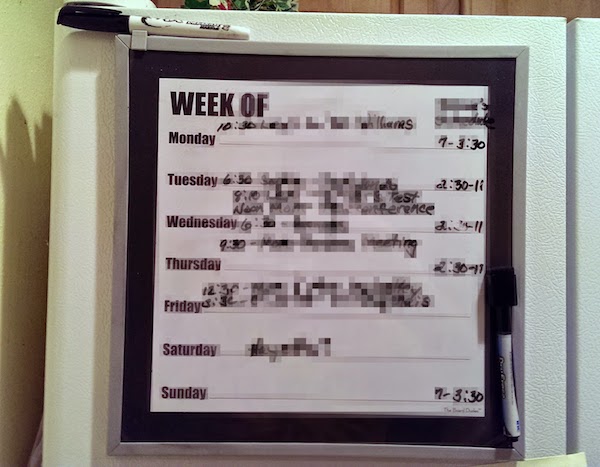6 Tips to Gear Up for a Special Needs School Year

Gearing up for a special needs school year is the last thing parents (or kids) want to think about in the middle of July. But as guest blogger Barb Dittrich has learned, the secret to a smooth transition from vacation to school is to start early. She’s with us today to share 6 tips she implements before the start of a new special needs school year.
6 Tips to Gear Up for a Special Needs School Year
We all wish the summer days would never end. A change of routine almost always means extra struggle for families with exceptional kids. Still, there are many things we can do to make the school year transition better for everyone.
Tip #1: Involve the Entire Family
If your family is anything like ours, there are multiple health issues, multiple emotional issues, varying personal expectations, jobs, and activities that play into the entire dynamic. In order for there to be any semblance of harmony in our home, everyone’s needs and issues must be laid out on the table. This likely requires a family meeting where all of these things are brought to the forefront and put on paper.
Tip #2: Get a Calendar Out for the Whole Darn Family
Is there anything worse than scheduling conflicts within your own household? Once the dates are laid out, get things on a calendar. For instance, I have one child who needs physical therapy while she’s juggling school and a job. I also have another child who needs visits to multiple other specialists. With yet another child who thrives on activity and needs extra help with homework, as well as a husband who likes to play, organization is a must. We even have chores to get worked into all of this busyness. Thankfully, a dry-erase one-week board on our refrigerator helps bring that week’s essentials front-and-center. This supplements our monthly calendar.

Tip #3: Be Informed
You must know what your family needs to survive and thrive. Are there accommodations that must be in place for your child to succeed this school year? Is there a better therapy schedule that needs to be adopted? Did that extracurricular activity cause more stress to the family than benefit last year? What are your rights if things don’t improve with the school district this year? Tapping into awesome resources like caregiving apps or the Wrightslaw website can be a real lifesaver!
Tip #4: Make Wise Purchases
You only have limited resources. After you have determined your priorities and educated yourself, explore what items you can access for the best value. That doesn’t always mean the cheapest price. Check with other parents to get insights on iPad cases, noise-blocking headphones or other adaptive equipment. In addition, look into medical equipment lending organizations or local charities that offer grants to help pay for some of this year’s serious necessities.
Tip #5: Practice!
While the notion of visiting a classroom and walking a schedule ahead of time may seem obvious to some, there are other things that you can do to practice for the new school year. Getting back into the rhythm of waking and bedtime at appropriate hours for the school year is helpful the month before. Practicing the routine for getting ready in the morning is helpful. Guiding instructors through the practice of what works for your child is useful as well. In The Don’t Freak Out Guide to Parenting Kids with Asperger’s, Sharon Fuentes makes a great case for sitting down with your challenged child ahead of the school year to complete a “One Pager” for the new teachers. With the amount of mind-numbing information in your child’s IEP, it will bless both your child and their instructors if you can put on one page what adjustments or accommodations will be needed to help your child have a successful year in school. For example, does specific seating help? Is a check-in/check-out system help your child with their day? As much as possible or age-appropriate, your child should drive what’s on this “one pager.” This gives them practice at advocating for themselves. And by the way, this brilliant idea is useful for any family with a child who has special needs, a disability, or a chronic illness.
Tip #6: Be on Medical Solid Ground
As much as possible, start the school year with a regular rhythm of medications, treatments and therapy in place. Make certain all of your important doctor’s visits and medical procedures under your belt. Having been there several times before, I can tell you that it makes the start to the school year extremely challenging when your child has to be out any time for the first month class is in session. Those first few weeks can literally set the tone for the entire school year.
While so many of us are still trying to fit in vacations, adventures and trips, turning our thoughts toward these preparations can make for a much smoother transition to a new special needs school year for us and our children in the weeks ahead.
How Do You Prepare for a Special Needs School Year?
What do you do to ease the transition to a new school year for your kids? Leave your tips in the comment box.
Do you like what you see at DifferentDream.com? You can receive more great content by subscribing to the quarterly Different Dream newsletter and signing up for the daily RSS feed delivered to your email inbox. You can sign up for the first in the pop up box and the second at the bottom of this page.
By Barb Dittrich
The mother of three children, all of whom have a variety of chronic illnesses or special needs, Barbara Dittrich founded SNAPPIN’ MINISTRIES (Special Needs Parents Network) in 2002 and currently serves as its Executive Director. The organization she leads was one of three finalists for WORLD MAGAZINE’S Hope Award for Effective Compassion in October of 2009, in conjunction with the American Bible Society. With a unique vision for serving parents of children with chronic illness, disability, or special needs, she has led the SNAPPIN’ MINISTRIES team in developing an innovative parent mentor curriculum. She lives with her husband of 20+ years in Wisconsin, and writes and speaks nationwide.
Subscribe for Updates from Jolene
Related Posts
Lessons from First Year EA/TEF Parents
Guest bloggers Katharine and Jake Kaczmarowski offer their own lessons from first year EA/TEF parents to you.
EA/TEF Awareness Month 2024
Jolene kicks off EA/TEF Awareness Month 2024 by explaining the rare condition and giving a preview of the month to come.
I Didn’t Want to Learn Hard Caregiving Lessons, but Now I’m Grateful
Jolene reflects on a lifetime of caregiving: “I didn’t want to learn hard caregiving lessons, but now I’m grateful.”






0 Comments